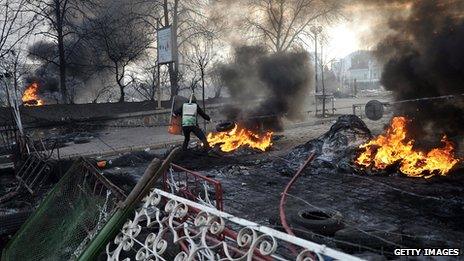Ukraine was in economic crisis long before the protests
- Published

Ukraine's economic outlook may be uncertain for some time
One ingredient contributing to Ukraine's political crisis and Standard and Poor's downgrade of the country's credit rating is a long history of poor economic performance.
When Soviet central planning came to an end and the Soviet Union broke up, the economies of the successor states contracted sharply.
Much the same happened to the Soviet satellites in Central and Eastern Europe.
Almost all have reversed the decline.
They have managed to grow beyond those pre-crisis levels, but Ukraine has not. Its economy is still smaller than it was in 1992.
Ukraine's economic burden
Poland provides a telling comparison. In 1992, using a method called purchasing power parity, their economies were similar sizes, Ukraine's being slightly the larger of the two.
Now Poland's economy is more than double the size of its neighbour's.
There are plenty of other measures that are very unflattering to Ukraine. It has a large current account deficit - that's trade in goods and services together with some financial transactions.
Last year's figure was 8% of annual national income, GDP, and that is money that Ukraine in effect has to borrow from abroad. A deficit of that size can be manageable if international financial markets have confidence in the economic outlook.
If they do not, it may be a warning of trouble to come.
Standard and Poor's credit rating downgrade reflects its judgement that Ukraine will struggle to meet its debt payments without financial assistance from either Russia or western powers and the International Monetary Fund (IMF).
Who can help?
In the case of Russia, the agency thinks any support would be linked to the political survival of President Yanukovych.
The west, in particular the European Union (EU), would be very reluctant to do it without the IMF. IMF involvement would mean an economic policy programme to tackle what they regard as serious weaknesses.
Simply negotiating such a programme would likely be a major challenge.
The previous one, the IMF says, "went off track as the authorities stopped implementing the agreed policies".
In reviewing that experience, the IMF even suggested that it might be useful for future IMF lending programmes to have "a mechanism to terminate off-track arrangements".
One central problem was Ukraine's reluctance to raise energy prices. It is a sector the IMF described as "opaque and inefficient".
Energy reform is also an important element in the association agreement negotiated with the EU. It was never signed by the Ukrainian president, a decision which sparked off the protests.
The EU deal would have committed Ukraine to move to market prices for energy. Not doing so means that the energy company Naftogaz runs a heavy deficit which in turn imposes an additional burden on already stretched government finances.
So even if the political situation does stabilise, the economic outlook remains profoundly uncertain.
- Published11 February 2014
- Published18 December 2013